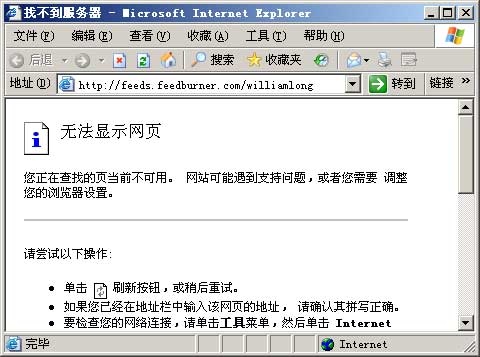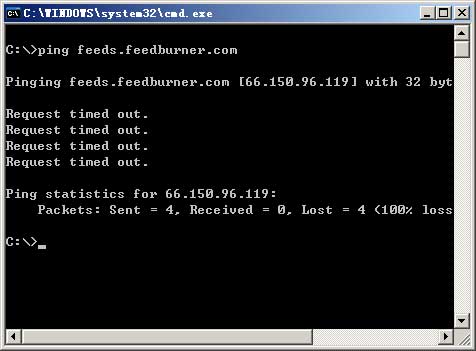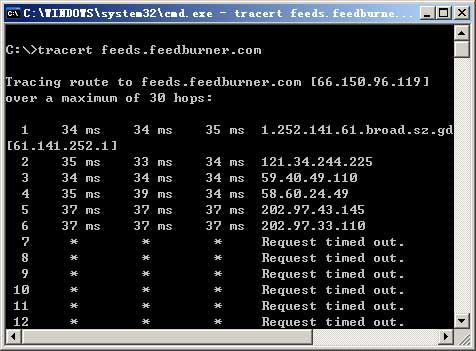This is my responded to
Zousuper's discussion on standalone blog's survival(Thanks for
danwei's translation). Later Zousuper's blog is blocked by Chinese government, but Zousuper is not render submissive, he set up a new host and blogging again. Here is the post:
The necessary conditions for setting up a blog on a separate domain in China - whether or not it is illegal, whether or not it requires registration - is currently a hotly debated issue. From the look of current policy, it seems that all standalone websites that have interactive information have to be registered.
There are issues of location here. If the server is overseas, then theoretically speaking registration is not necessary, but there is no way to guarantee that the server's IP will be accessible. Rose Luqiu's
1510 Blogs is a typical example. When a large proportion of visitors are from the mainland, then under normal circumstances a mainland server will be chosen. This is when we arrive the question of the blog's legality.
Here I'll summarize the steps and conditions for
legally setting up a blog on a standalone domain; this should be basically the same in all major cities across the country.
Website registration is not a simple question. MII registration is just a basic registration, suitable for non-forum websites that do not have interactive information. If you think that MII registration will solve everything, then you are very wrong. Of course, you could close the comments section to your blog and voluntarily choose not to disseminate "harmful information"; in that case the MII registration would be enough. If your website allows leaving messages and exchanging information, and its traffic is low, you may be able to simply get by. In general, for normal small websites, MII registration is enough.
If your website traffic is relatively large, particularly if it is highly interactive, like a forum or a blog, then you'll face the appearance of so-called "harmful information." Normally, when you discover "harmful information," someone will be tasked with notifying the webmaster to delete it; it becomes a problem when it occurs frequently.
Strictly speaking, individuals are not permitted to provide BBS services on the Internet (interactive online services in which users provide information for release, including message boards, electronic whiteboards, e-forums, online chat services, and guestbooks) without formally registering or passing review by state communication administrators. To providing interactive forum and guestbook services, you must set up "technological measures for network security," in addition to registering with the PSB's Internet Supervision Center. This means a system for review, control, and deletion of information, as well as associated "computer security personnel."
Usually, registering with the PSB Internet Supervision Center is pretty complicated and drawn-out. The registration is vastly different from MII's: it is very strict. If your website supports BBS, forums, guestbook, or chat services, then you must provide the following materials:
- A copy of the computer security personnel certificate;
- Registered Internet user network security form;
- Providers of Internet services for news, publishing, education, health, pharmaceuticals, and medical equipment must be approved by the appropriate government agencies in accordance with laws and regulations, and must present the government approval documents at the time of registration.
The computer security personnel certificate is typically obtained by paying 660 yuan to be trained and tested. That means that if you want to write a blog, you must first pass the "security worker" exam. The registration form basically requires writing out your name, ID#, home address, mobile phone number, and place of work, so that if there are any problems you can be arrested on the spot. If you do not provide this information, then your registration may not pass.
After you've registered, you then face the work of looking out for and cleaning up "harmful information" - this is the responsibility of the "computer security personnel." Because the appearance of "harmful information" on a forum or blog is ultimately the responsibility of the webmaster, the PSB will carry out punishment against the webmaster according to the volume of "harmful information" that is circulated. Here you'll run into the issue of standards for punishment. Current punishment standards takes into account the number of registered users, the quantity of circulating information, the hit count, and illegal revenue; so long as one area exceeds the standard then you're determined to be in "extremely serious circumstances." An article clicked by one person is completely different from the same article clicked by 10,000 people; are you able to guarantee 24-hour review for your personal blog or forum? If you cannot, then hiding your webpage counters and your pageview numbers may cut down on some unwanted trouble. At the same time, you should keep your website income a secret; there is nothing good and a whole lot bad about making your website's income public. Under normal circumstances, this is a standard for determining punishment. The greater your website's income, the more serious the problem, and the worse off you will be.
Hence, if you have a forum or a guestbook system, you've got a hidden time bomb. "Harmful information" will cause a lot of trouble for the webmaster when it surfaces. So if you have a forum, it's best to put it on a separate domain name and move it to an overseas server unless you can guarantee you'll be online 24 hours a day to prevent every single bit of "harmful information" from being published. Otherwise you're giving them an angle to get you.. So high-risk systems like forums should be moved out. The same goes for guestbooks and comments to blog posts. If you cannot cut off comment functions, then you must implement keyword filters to turn every sensitive word into ××. Doing this will save you a bit of unnecessary trouble.
In short, there is currently no clear idea about the system for registering blogs, but for most blogs that have a fair number of comments and discussion, it's no good to simply register with MII; you have to go to the local PSB's website to register for it to have any effect. And you must maintain a good relationship with the local PSB. Whatever they want, you give it to them; don't antagonize them, and don't dispute matters of theory with them. Don't say anything when it's not your turn - it won't work, anyway.
Sources:William Long: The way for standalone blogs to survive (Chinese)


